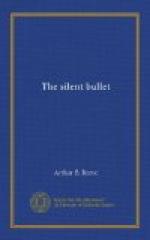“I have read only what the newspapers have published,” replied Craig to the doctor’s look of inquiry. “You see, my friend Jameson here is on the staff of the Star, and we are in the habit of discussing these cases.”
“Very glad to meet you, Mr. Jameson,” exclaimed Dr. Hanson at the implied introduction. “The relations between my office and your paper have always been very satisfactory, I can assure you.”
“Thank you, Doctor. Depend on me to keep them so,” I replied, shaking his proffered hand.
“Now, as to the case,” continued the doctor slowly. “Here is a beautiful woman in the prime of life, the wife of a very wealthy retired banker considerably older than herself—perhaps nearly seventy—of very fine family. Of course you have read it all, but let me sketch it so you will look at it from my point of view. This woman, apparently in good health, with every luxury money can buy, is certain within a very few years, from her dower rights, to be numbered among the richest women in America. Yet she is discovered in the middle of the night by her maid, seated at the table in the library of her home, unconscious. She never regains consciousness, but dies the following morning.
“The coroner is called in, and, as his physician, I must advise him. The family physician has pronounced it due to natural causes, the uremic coma of latent kidney trouble. Some of the newspapers, I think the Star among them, have hinted at suicide. And then there are others, who have flatly asserted it was murder.”
The coroner’s physician paused to see if we were following him. Needless to say Kennedy was ahead of him.
“Have you any facts in your possession which have not been given to the public yet?” asked Craig.
“I’m coming to that in a moment,” replied Dr. Hanson. “Let me sketch the case first. Henry Vandam had become—well, very eccentric in his old age, we will say. Among his eccentricities none seems to have impressed the newspapers more than his devotion to a medium and her manager, Mrs. May Popper and Mr. Howard Farrington. Now, of course, the case does not go into the truth or falsity of spiritualism, you understand. You have your opinion, and I have mine. What this aspect of the case involves is merely the character of the medium and her manager. You know, of course, that Henry Vandam is completely under their control.”
He paused again, to emphasise the point.
“You asked me if I was in possession of any facts which have not been given to the press. Yes, I am. And just there lies the trouble. They are so very conflicting as to be almost worse than useless, as far as I can see. We found near the unfortunate woman a small pill-box with three capsules still in it. It was labelled ‘One before retiring’ and bore the name of a certain druggist and the initials ‘Dr. C. W. H.’ Now, I am convinced that the initials are merely a blind and do not give any clue. The druggist says that a maid from the Vandam house brought in the prescription, which of course he filled. It is a harmless enough prescription—contains, among other things, four and a half grains of quinine and one-sixth of a grain of morphine. Six capsules were prepared altogether.




